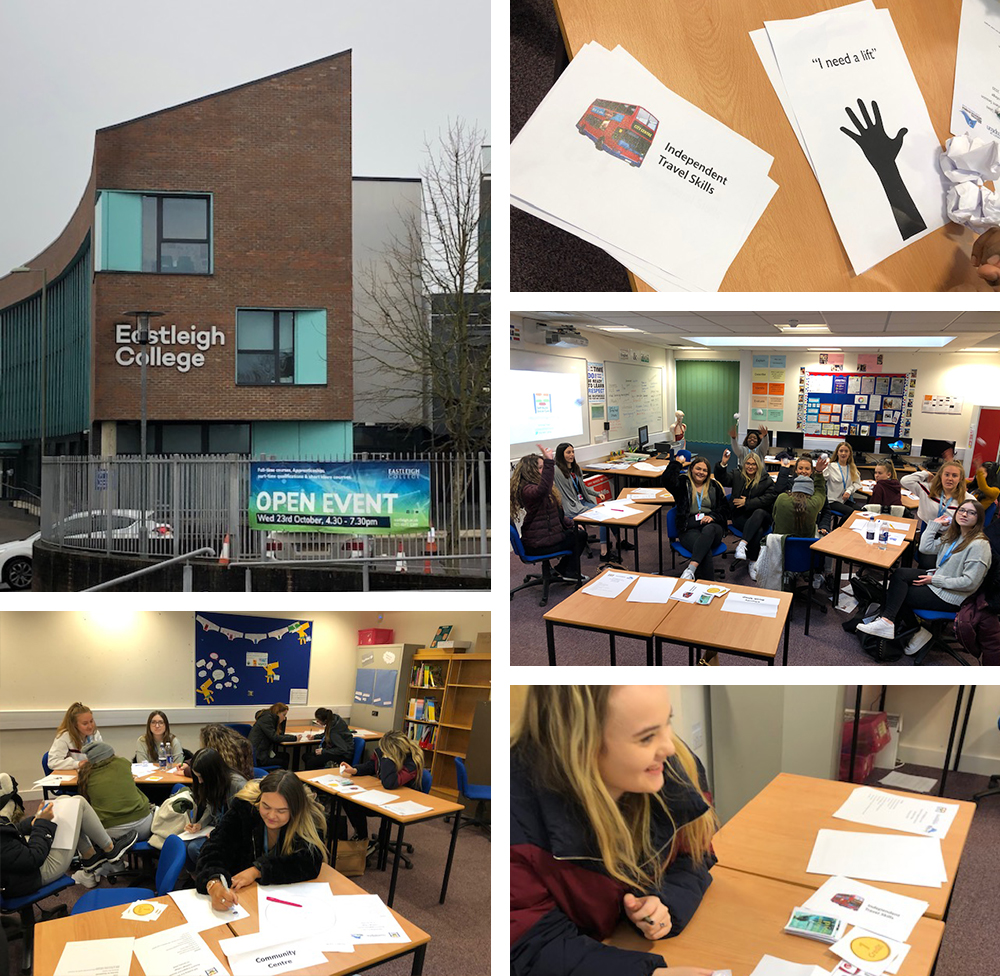Taking the project to college

I welcome every chance I can get to speak with people working in social care, particularly the next generation of people who are still passionate about making a change. This can sometimes involve working with social work interns, or speaking at practitioner events. Last month (23rd January), I got the opportunity to share our research with Health and Social Care learners at Eastleigh College, a vocational college offering a Level 3 course for learning the knowledge, understanding and skills essential to the health and social care sector.
From the outset, I could see that the learners were passionate about discovering more about the different avenues into working in the sector, with pathways onto nursing, social work, specific practitioner roles like Occupational Therapy, and care work more generally.
I’ve encountered many experiences of speaking to new groups of people about our research before, but it felt like this group were the real deal and held an equal mixture of scepticism with a willingness to learn. To start, my trusty side-kick for the day Andy Coverdale (our experienced research fellow) and I began by getting the learners to think about their own lives, including the people in their life and their weekly schedules of places and activities. This helped them to begin to think about the idea of self-building their daily lives, and what kinds of support they have had and currently rely on to enable them to do this.
Next was a role-play session which had been in development for several weeks. We had designed a session where each learner takes on the role of a character in a social care landscape. Five characters had learning disabilities with very different experiences and support networks. Five characters worked in various roles within social care including a social worker, a personal assistant, a volunteer, and a care worker in a group home. And five characters ran local organisations including an advocacy organisation, a friendship group, a college, and a local bookshop.
After the usual hesitation (oh no, not a role play!), people very quickly got into the roles with gusto. We gave each participant enough freedom to make their own decisions about what path they could take, but they had to work with the support that was available and the limitations that they had.
This opened up a whole host of points that we could share insights from our research. Some couldn’t believe it was so complicated a landscape to navigate and how people can get ‘stuck’. The feedback from the participants showed that the role play had been the first time that they ‘lived’ the system, as they were faced with navigating it with the different barriers and hurdles to jump through. The idea of having to build up confidence to have one’s voice heard (sometimes over years of doing self-advocacy) – a common experience shared from our research participants with learning disabilities –was something they had never considered.
Individual encounters like this session aren’t going to change the social care landscape overnight. But the session was really an opportunity to test out an approach which colleges and universities around the country that teach social care, including degree programmes for practitioners, could use to help inspire a new generation of people working in the sector to experience some of the lived realities of people with learning disabilities seeking support and the challenges of adapting organisational structures to support this group.
Thank you @Eastleigh_Col social care learners and their lecturer Charlotte Burgess for taking part in the research event. The role play was a great model for exploring the challenges and opportunities of self-building a life using social care support. Thanks also to @ESRC for funding the research behind this activity. For others interested in hearing more about the session and potentially using the materials, please get in touch.
Contact: Andy Power (a.power@soton.ac.uk)





